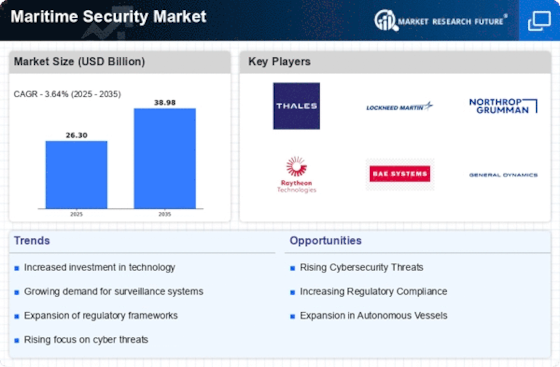Top Industry Leaders in the Maritime Security Market

The maritime security market, encompassing solutions for safeguarding seaborne trade, critical infrastructure, and national borders, is a complex and ever-evolving landscape. Driven by rising geopolitical tensions, piracy threats, and increasing criminal activities at sea, this multi-billion dollar arena witnesses fierce competition between established giants, agile start-ups, and diverse government entities.
Key Players:
- BAE Systems
- Thales Group
- Elbit Systems Ltd
- ESC Global Security
- Harris Corporation
- Honeywell International Inc
- Kongsberg Maritime
- Leonardo
- Lockheed Martin Corporation
- Northrop Grumman Corporation
- Raytheon Company
National Governments and Coast Guards: Many countries invest heavily in indigenous maritime security capabilities, with agencies like the US Coast Guard and China Coast Guard playing a significant role in the market.
Strategies Adopted:
System integration and interoperability: Seamless integration of diverse security solutions, from sensors and radars to communication systems and automated control, is crucial for comprehensive maritime domain awareness.
Focus on emerging technologies: Investments in AI, machine learning, big data analytics, and autonomous platforms are key to enhancing threat detection, prediction, and response capabilities.
Specialization in specific domains: Players are focusing on niche areas like underwater surveillance, port security, or piracy deterrence, catering to specific threats and operational needs.
Partnerships and collaborations: Collaboration between government agencies, technology companies, and academic institutions fosters innovation and accelerates technology development.
Data-driven decision making: Leveraging advanced analytics platforms to gain insights from maritime data, optimize patrol routes, and predict threats before they occur.
Factors for Market Share Analysis:
Technological sophistication: The level of technological advancement and integration within security solutions directly impacts effectiveness and market appeal.
Government contracts and funding: Securing long-term contracts for national security programs or coastal defense upgrades drives significant market share.
Operational effectiveness: The ability to detect and deter threats, protect critical infrastructure, and ensure maritime safety is paramount for market success.
Cost-effectiveness: Balancing cutting-edge technology with affordability is crucial, especially with budget constraints in many countries.
Compliance with regulations and international standards: Adherence to maritime safety and security regulations is essential for market access and legitimacy.
New and Emerging Companies:
Counter-Drone Technologies: Companies like DroneShield and Dedrone are developing advanced systems to protect ports and vessels from drone attacks and aerial surveillance.
Cybersecurity and Maritime Cyber Resilience: Companies like Cyberbit and Maritime Cyber Security offer solutions to protect maritime communication networks and critical infrastructure from cyberattacks.
Autonomous Maritime Vehicles (AMVs): Companies like Sea Machines and Hydromea are pioneering the development of unmanned surface vessels for patrolling, surveillance, and logistical support.
Industry News and Current Investment Trends:
Increased focus on information sharing and regional collaboration: Initiatives like the Global Maritime Distress and Safety System (GMDSS) and information sharing centers foster coordinated responses to maritime threats.
Growing demand for advanced underwater surveillance solutions: Threats from submarines and underwater drones are driving investment in UUVs with enhanced range, autonomy, and sensor capabilities.
Focus on environmental and sustainable solutions: Development of green technologies for maritime security, like solar-powered ASVs and eco-friendly surveillance systems, is gaining traction.
Rise of private security companies: Private security firms are increasingly providing services like vessel protection, anti-piracy operations, and risk assessment for commercial shipping companies.
Overall Competitive Scenario:
The maritime security market is a dynamic and fiercely competitive landscape. Established players face challenges from agile start-ups offering niche solutions and disruptive technologies. Success in this environment will depend on continuous innovation, strategic partnerships, and the ability to adapt to evolving threats, regulations, and environmental considerations. As global trade volumes increase and maritime security threats continue to evolve, the market is poised for significant growth, shaping the future of safe and secure seafaring in the years to come.
Recent Industry Development
On June 30, 2023, India and the Philippines revealed a collaborative effort to strengthen maritime security. This extended defense partnership will facilitate access to a concessional line of credit for purchasing defense equipment, fostering interaction among defense agencies. Additionally, the establishment of a Defense Attaché office in Manila and the consideration of India's proposal further solidify this alliance.
Earlier, on June 3, 2023, India and Vietnam convened the 3rd Maritime Security Dialogue in New Delhi, emphasizing their dedication to upholding a secure maritime environment. Amid escalating Chinese assertiveness in the area, both nations aim to bolster regional and global mechanisms, fortifying comprehensive maritime security. This dialogue reaffirms India and Vietnam's joint commitment to sustaining a secure maritime environment amidst mounting challenges posed by China.
On May 10, 2023, the European Union (EU) identified India as a pivotal partner for trade and maritime security initiatives in the Indo-Pacific region. EU officials plan to heighten joint patrols and exercises in the northwest Indian Ocean, highlighting India's increasing significance as a strategic ally in the Indo-Pacific. Over recent years, bilateral relations between the EU and India have notably strengthened, with a considerable enhancement in security cooperation.











